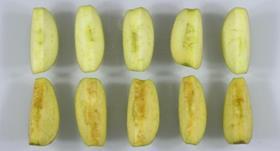
The world's first genetically modified apples will be grown commercially in the US for the first time following a decision by the US Department of Agriculture to approve two non-browning versions of Golden Delicious and Granny Smith for large-scale planting.
The varieties, which were developed using biotechnology by Canadian group Okanagan Specialty Fruits (OSF), will be marketed under the Arctic brand are likely to be on the market in 2016, according to the company’s president Neal Carter.
It is expected that the USDA’s Animal and Plant Health Inspection Service will publish its final environmental assessment and plant pest risk assessment shortly.
“This milestone is nearly two decades in the making, as Arctic Golden and Arctic Granny apples represent OSF’s first products since our inception in 1996,” Carter commented.
“We’re very excited for everyone who touches apples to experience the benefits of non-browning apples, and encourage you to read about the significant value they offer to growers, packers, fresh-cut and traditional processors, foodservice, retailers, and most of all, consumers.”
He added that the supply chain should feel confident that Arctic apples, which OSF says are identical to their conventional equivalents besides the fact they do not brown when cut, were probably “the most tested apples in existence”.
“All evaluations reach the same conclusion,” he said, “Arctic apples present no unique risks and are just as safe and healthful as any other apple.”
But it’s also true that the Arctic series has faced stiff opposition, not least from the Organic Consumers Association (OCA), which argued against granting approval on the grounds that genetic changes to prevent browning could adversely affect human health, while suggesting that pesticide residue levels on the apples might also be higher than otherwise necessary.
“This whole thing is just another big experiment on humans for no good reason,” said OCA director Ronnie Cummins.
Five years ago, OSF applied for non-regulated status for the two varieties and, since then, has been working to find potential commercial partners, including growers and processors, to bring the Arctic apples to market once regulatory approval was granted.
In 2012, the USDA’s Animal and Plant Health Inspection Service opened a 60-day review period for members of the public to offer comment on two non-browning apple varieties, Arctic Golden and Arctic Granny.
Later that year, Carter used a speech at a TEDx event in Canada to deliver an empassioned defence of agricultural biotechnology.



